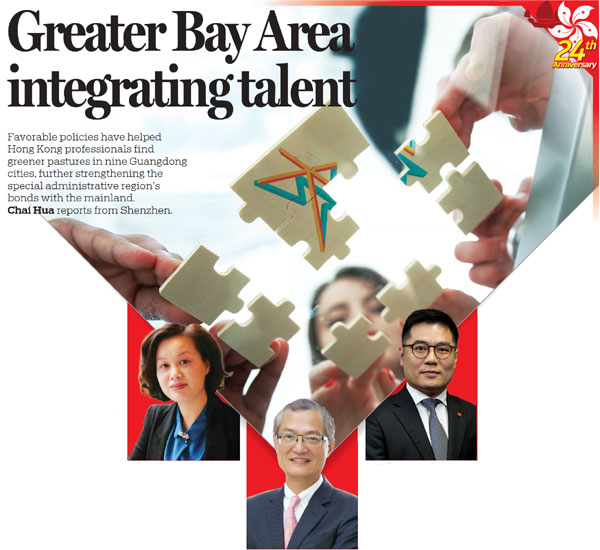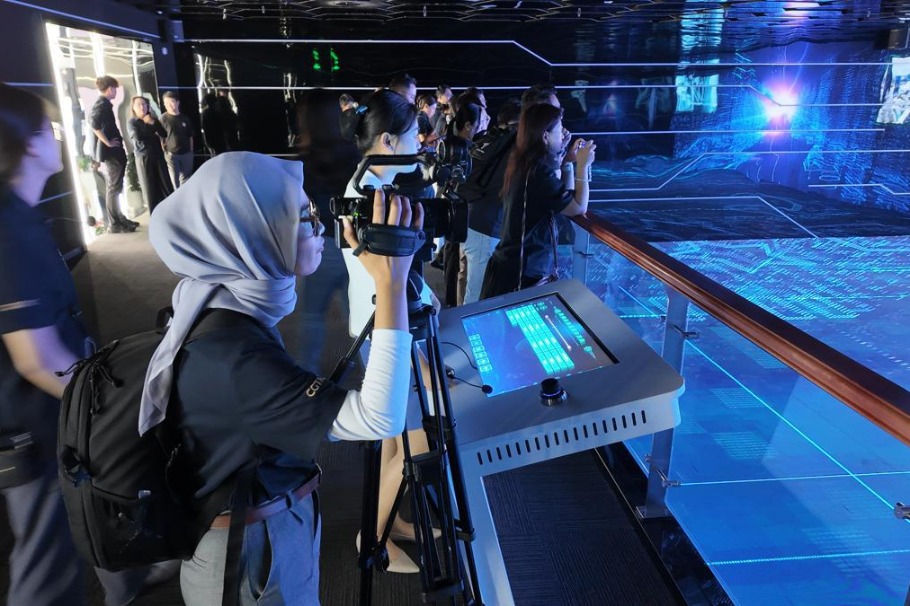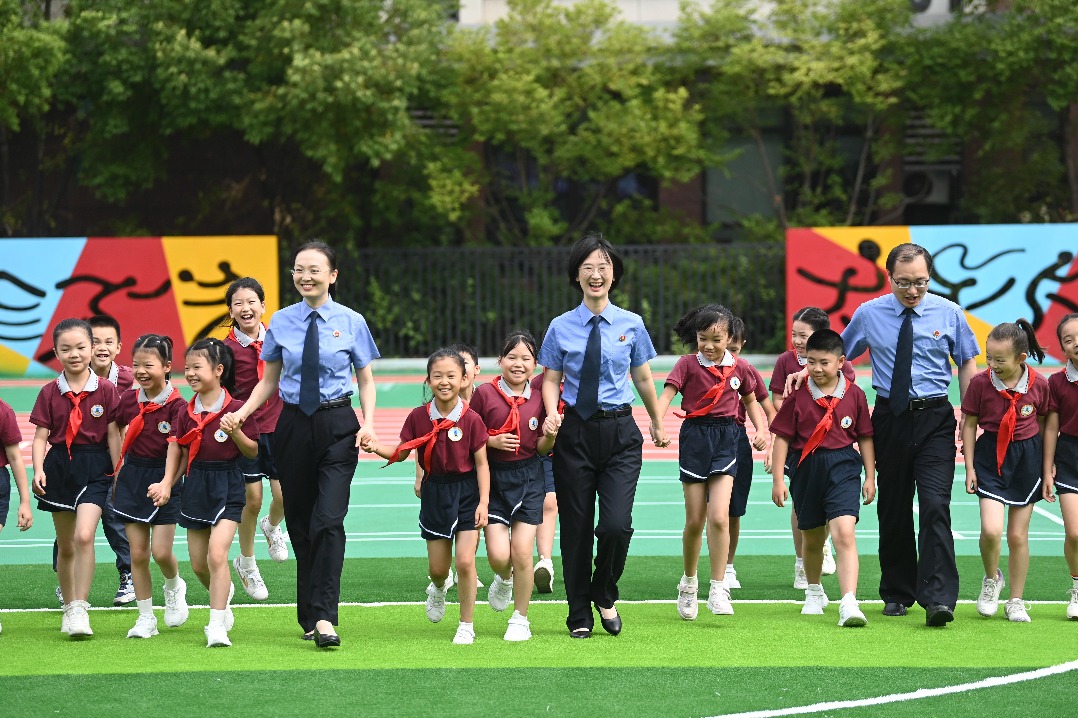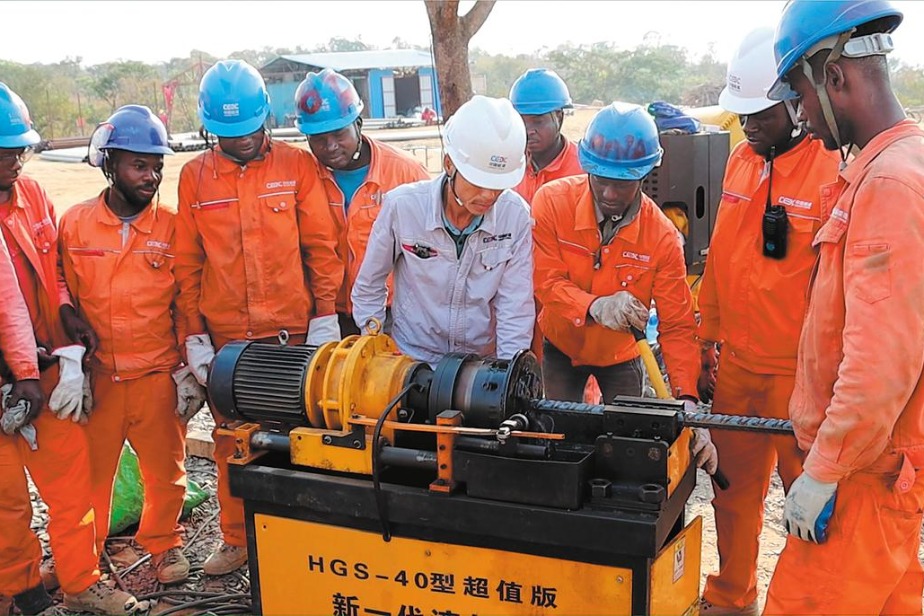Greater Bay Area integrating talent
Favorable policies have helped Hong Kong professionals find greener pastures in nine Guangdong cities, further strengthening the special administrative region's bonds with the mainland. Chai Hua reports from Shenzhen.


Lo Chung-mau, chief executive of the University of Hong Kong-Shenzhen Hospital.
George Chong, contract director of China State Construction International Medical Industry Development Co.
The close bonds between Hong Kong and the Chinese mainland have never been stronger, having withstood the test of time, as well as the strains of the pandemic.
As the Hong Kong Special Administrative Region marks its 24th anniversary, bilateral collaboration, particularly in the financial, business and technological fields, has neither flinched nor stopped. On the contrary, salient breakthroughs have been made in deepening economic integration and fostering exchanges of professionals across a wide spectrum of businesses despite the cross-border travel curbs that have been in place for almost one and a half years to check the spread of COVID-19.
Special examinations, or simplified application requirements, have been offered for Hong Kong professionals, such as doctors, lawyers and architects, to enable them to practice and spend more time in the Guangdong-Hong Kong-Macao Greater Bay Area. They agreed that the experience has deepened cross-border integration and strengthened communication with their peers there.
Closer integration testifies to the growing demand for professional services in the Greater Bay Area that covers nine cities in Guangdong province, as well as the Hong Kong and Macao special administrative regions. But experts in various sectors say there is still room for further improvement.
COVID-19 has thrust the medical profession into the forefront as the demand for doctors and improved medical facilities grows. With the quarantine requirements still in force, some Hong Kong patients under the care of the city's Hospital Authority but who live in Guangdong are unable to have follow-up medical consultations in the SAR. In response to their needs, Hong Kong authorities launched a program in November that provides a subsidy of up to 2,000 yuan ($310) for each patient to have medical consultations at the University of Hong Kong-Shenzhen Hospital. The public hospital, located in Shenzhen's Futian district, is one of the university's two teaching hospitals. Opened in 2012, it was built and funded by the Shenzhen municipal government.
"What's more important is that the subsidy scheme allows encrypted copies of Hong Kong patients' medical records to be sent to us for reference," said Lo Chung-mau, the hospital's chief executive.
"This is a major breakthrough that we hope could be the starting point for mutual recognition of medical records across the Greater Bay Area," he said.
Moreover, the Hong Kong and Macao Medicine and Equipment Connect was implemented earlier this year. Under this measure, designated mainland hospitals in the Greater Bay Area can use Hong Kong-approved drugs and medical devices without prior certification from the National Medical Products Administration.
"The pandemic may have impeded our interaction, but it has injected a new impetus into cross-border integration," Lo said.
Many Hong Kong doctors, like Lo, who used to work in Shenzhen and return to Hong Kong each day have been unable to keep up with the routine and decided to live in Shenzhen instead, at least most of the time, until the travel restrictions and quarantine rules are lifted.
It used to be difficult for Lo and other Hong Kong doctors to fully take up professional practices across the border. "When our hospital opened nine years ago, I didn't even know what my title here should be," he recalled.
In Hong Kong, Lo holds the rank of a consultant - the title for a senior hospital-based physician or surgeon who has completed all of their specialist medical training. With more than three decades' experience under his belt, he is also director of the Liver Transplant Center at Queen Mary Hospital and a professor of the Department of Surgery at the University of Hong Kong.
Without a proper title, Lo, like other highly experienced Hong Kong doctors at his hospital, faced hurdles in performing surgeries and applying for scientific research projects.
The turning point came in April, when the Shenzhen government decided to simplify the recognition of qualifications to enable medical personnel from Hong Kong and Macao to practice on the mainland.
HKU-SZH was designated as a pilot medical facility that can review professional titles itself. So far, more than 37 Hong Kong consultants have been recognized as chief physician - one of the highest ranks in the mainland's medical system.
After being granted the title, Lo's next step was to unify the training systems on both sides of the border so that mutual recognition could be made much easier. The two systems are very different, he explained. For instance, it would require seven years of clinical practice after academic studies for a doctor to become a specialist in Hong Kong, compared to just three years on the mainland.
Lo suggested that Shenzhen should adopt rules similar to Hong Kong's, and HKU-SZH could take the lead before extending the regulations to more mainland medical institutions.
Making progress in difficulties
Apart from medical services, other industries have also been badly hit by the pandemic. But many professionals involved in cross-border businesses are coping with the challenge by tapping nascent markets and creating offbeat operation models together.
Wang Shouqun, managing partner of China Commercial Lam Lee Lai Lawyers in Qianhai, Shenzhen - the first joint venture firm between Hong Kong and mainland in the legal profession - lamented that cross-border businesses have shrunk as the global operations of many of its clients have withered.
She told China Daily they have explored new operation modes and markets to soften the pandemic's impact. She found that the business of company compliance consulting and intellectual property protection in overseas markets is flourishing.
Her company has carried out cross-border and long-distance notarization through online videos with the approval of the Qianhai Notary Office.
As for cross-border recognition of professional qualifications, Wang said the legal services sector has also made some breakthroughs.
Previously, the first step for Hong Kong lawyers to practice on the mainland was to take a national judicial examination to gain a certificate, like mainland law graduates. But it is an uphill battle for Hong Kong residents in view of the vastly different legal systems and languages adopted on both sides.
To ease the restriction, the central government said in 2019 that eligible legal practitioners from Hong Kong and Macao could take a special examination in Shenzhen to enable them to practice in the nine Guangdong cities in the Greater Bay Area.
Details of the examination were released in October, and a date was agreed upon in January.
Pang Wan-hei, president of the Law Society of Hong Kong, said at a webinar in April that more than 600 Hong Kong legal practitioners had signed up for the special examination, but it had to be postponed because of the quarantine measures on the mainland.
According to Wang, six professionals at her law firm have enrolled for the examination. Currently, the firm has eight Hong Kong-recognized and four Macao-recognized lawyers. "Our joint venture is unique by hiring lawyers directly from the two SARs. But if they wish to work for mainland law firms, they would have to apply for mainland certificates," she said.
In addition, the firm has two Hong Kong professionals with mainland qualifications. Wang described the special examination as a breakthrough for legal practitioners from Hong Kong and Macao who intend to tap the Greater Bay Area market.
She explained that the purpose of the novel measure is not just to offer Hong Kong lawyers more career opportunities and let them compete with their mainland counterparts, but to give full play to their experiences and expertise in dealing with international legal cases, such as those concerning company compliance and IP protection.
Regarding further integration, she said the qualification recognition is just the first step, and urged Guangdong authorities to offer more preferential policies for eligible Hong Kong lawyers to develop their businesses there.
Further training and interactions would help Hong Kong professionals better adapt to the mainland's business environment, while incentives for government and State-owned firms to employ more Hong Kong talents and purchase more Hong Kong firms' services would also be effective, Wang said.
Discovering opportunity in crisis
For architects, special examinations have been arranged for mutual recognition of their qualifications since 2003 when the Closer Economic Partnership Arrangement between Hong Kong and the mainland was signed, granting Hong Kong enterprises and residents preferential access to the mainland market. However, architects need to be employed by an organization qualified for construction engineering and design if they want to use the title earned through the exam in practice.
The requirements for Hong Kong or mainland companies to be eligible for such qualification are also high, including a registered capital of 60 million yuan and the stipulation that each company must hire more than 500 specialists, such as architects, engineers and soil experts. Fortunately, in September, the Qianhai administrative authority introduced a new registration system for eligible Hong Kong architects and institutions to work directly in the zone, removing previous restrictions.
In January, the policy was extended to the nine Guangdong cities in the Greater Bay Area. What's worth mentioning is that online applications are allowed, taking into account the pandemic's control and prevention measures.
George Chong, contract director of China State Construction International Medical Industry Development Co, is among the first batch of recognized professionals hired through Qianhai's new policy.
He had been involved in the construction of the Hong Kong Infection Control Center and the AsiaWorld-Expo treatment facility, which are backed by the central government in helping Hong Kong to combat COVID-19.
"Through the two projects - the result of collaboration between Hong Kong's and mainland's construction industry and officials - we have brought Hong Kong's high-standard construction models and requirements, especially the medical facilities, to the attention of mainland professionals and officials," Chong said.
"The design and building of hospitals and other medical facilities represent the highest standards in construction projects," he added, describing the market the medical facilities involved as "very new and exciting".
Seeing the potential for the sector, Hong Kong-based China State Construction International Holdings set up its branch on the mainland in 2019, which is dedicated to the development of the medical industry, as the pandemic has sparked greater demand for high-quality medical facilities in the country.
According to Chong, they have been invited by local governments, biochemical centers, and public and private hospitals in Yunnan, Guangdong and Sichuan provinces to cooperate in various projects. However, he said, their main target will remain the Greater Bay Area before the company expands to other areas.
Since Chong's job involves in developing the mainland's medical facilities, he has to undergo weeks of quarantine on trips across the border. To soften the ordeal this situation brings, after 14 days of quarantine in Shenzhen in March, he spent three more months in the city, which made it the longest business trip to the mainland for him.
"Actually, it gave me a chance to look around in various places and hang out with my mainland colleagues, so I could better understand them and have a better idea of the markets and traditions in different cities."





































